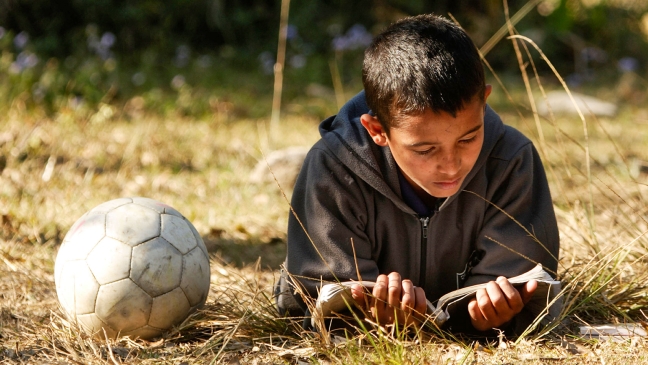Consider the following passage:
“Today was the big match, the last game of the season. There was only a minute of the game left and neither team had scored. The crowd watched in silence as Jake took the penalty kick. The goalkeeper missed the ball and the crowd cheered and roared. Jake had scored the winning goal. His teammates were very happy. After the match, both teams went back to the changing room. Jake got his shampoo and towel, and had a shower. Afterwards, he put his cleaning stuff away in his locker and went home.”
What was Jake doing? How do you know?
The answer, of course, is that Jake was playing football. To arrive at the answer, we have to make links between different bits of the text. We make links between the words that are related to sport, and football in particular: penalty kick, goalkeeper, winning goal, match, changing room. We follow the story and connect the events; Jake had a shower afterwards, so he was probably hot and sweaty after being involved in the game. In the sentence “His teammates were very happy”, we know that the word “his” relates to Jake, and so the teammates are the people he was playing with.
To make sense of all this, we build meaning. We understand how the words, phrases and sentences come together to help us understand. This is a messy, complicated process. You may not even explicitly recognise how you do it. Children do not necessarily learn to do it at all.
Why is that? We know there are some things that may predict that children will find it hard to answer a question like the one above.
Identifying pupils who may struggle with reading comprehension
Poorer comprehenders can be less skilled at telling (and writing) well-structured stories. They can fail to understand how pronouns such as he, she, it, his, her and their connect sentences and ideas together when they read.
Poorer comprehenders are also more likely not to be able to add in another paragraph, or carry on with the narrative in a way that fits in with the structure, showing that they do not understand how sentences cohesively build upon each other. They may have a limited vocabulary or be less efficient at building vocabulary, which means they are not able to make the links between words to infer a connection. They may find it challenging to read longer texts because although your limited working memory is not likely to affect your understanding of short extracts, it may be harder to keep your coherent understanding of the text going over longer texts.
More from Megan Dixon:
These aspects of thinking, which ensure that we understand as we read, do not rely on word reading - this is different.
Yet how much do we know about how children comprehend when they read - or listen to texts being read to them - and the strategies they use to make sense of text? Do we ask?
When a teacher reads a story to their class, they help the children’s comprehension through their tone of voice, phrasing, pausing and characterisation. Would children understand if we didn’t do this? Do we know? Do we check?
We are encouraged to wait until children are efficient at decoding words before we consider their comprehension. Yet, as reading comprehension expert Jane Oakhill has pointed out - in the book that the extract above was taken from - early screening using tasks that assess listening comprehension or the understanding of cartoon sequences could provide an indication as to which children are likely to go on to have problems with reading comprehension later, regardless of their word reading skills.
The importance of developing children’s comprehension ability from a very young age to support their subsequent reading comprehension cannot be overemphasised. But at the moment there is a lot about children’s comprehension skills that teachers simply don’t know.
I think we need to change that.
Megan Dixon is a doctoral student and associate lecturer at Sheffield Hallam University






